Scout Inna
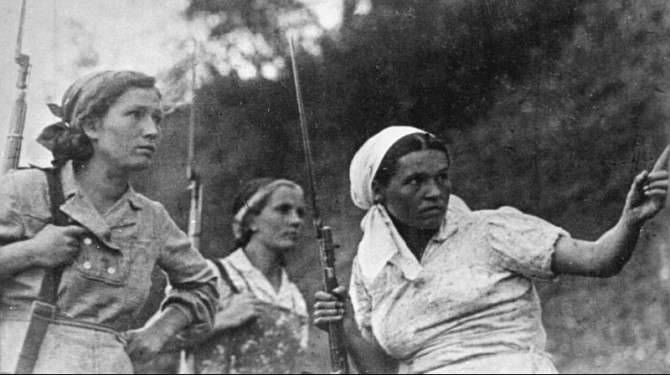
It remains to wonder where only this girl had such great forces to overcome all the adversities that she and her generation had to try! Twice she fell into captivity, but taking advantage of the situation, she was able to escape from the clutches of imminent death twice, which flew around with a kite in the form of black police uniforms and polished Gestapo boots that beat without a drop of mercy into a fragile, rounded girl's belly ... Times Inna Konstantinova was not given. Her father and mother remained alive and read the diary of a dead daughter with tears.
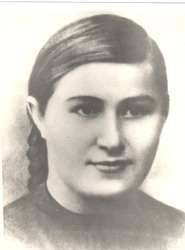 Four days before the eighth of March, the women's great day, which today our brazen women use shamelessly, distorting their lips with plastic, and their souls with money, Inna joined the guerrilla unit and left with them 4 March 1942 of the year in the deep forests where the second Kalininskaya stationed guerrilla brigade.
Four days before the eighth of March, the women's great day, which today our brazen women use shamelessly, distorting their lips with plastic, and their souls with money, Inna joined the guerrilla unit and left with them 4 March 1942 of the year in the deep forests where the second Kalininskaya stationed guerrilla brigade.For four months, Inna gained experience. She listened attentively to her comrades, slowly studied all the wisdom of conducting intelligence. But there was no time for the partisans; there was a war that required obtaining new intelligence information, according to which further decisions could be made. Therefore, for the first time, Inna was sent to reconnaissance in early July with a farewell not to get involved in any alterations, to be as accurate as possible. “Take care of yourself, please, girl,” obviously, as senior intelligence officers could say to her, who obviously, much better than she imagined what a failure of a young partisan scout could turn into. They were well aware of how the German henchmen and the Gestapo "workers" of the Soviet partisans could subject the deadly torment.
The girl managed to cross the front line in the area of two villages, which had very nice names - Talankino and Pustoshkina. She found out how many German units are based here, where there are observant police posts. But on the way back she hesitated and was stopped by a police patrol, she seemed somehow suspicious to one of the policemen, and the village elder put her in a bathhouse to clarify the circumstances.
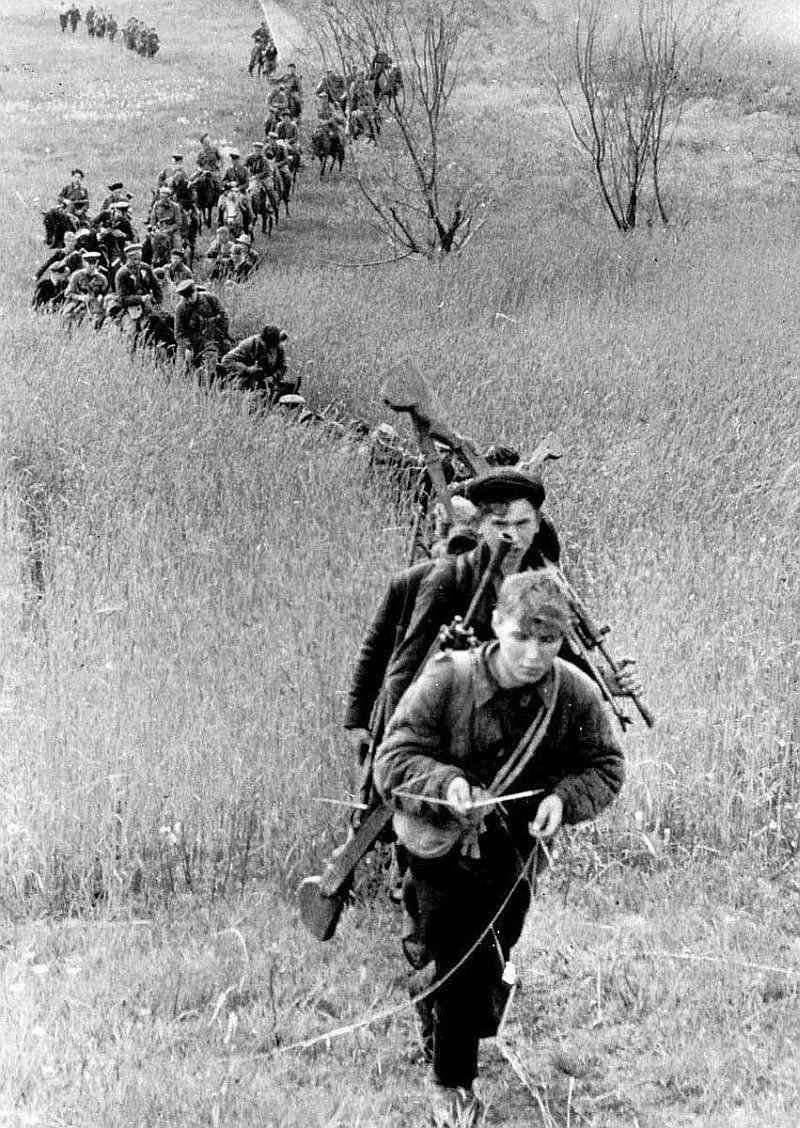
Inna was disappointed that it was in this village, on the outskirts, that she was supposed to meet with her comrades, and here the reinforced police squad was in a hurry.
In the dark of night she thought for a long time and did not think of anything, and only walked around the close bath in circles, and for some reason she had the idea (she was saving) to try to disassemble the ceiling of the village bath. She climbed onto the stove and began to scratch out putty, dust. Fortunately for Inna, the logs were old, rotten here and there, one of them succumbed, the second. She breathed in the fresh summer air, listened, the dogs barked in the distance, but there was no one around. Everyone went to bed, hoping that there was no need to guard such a girl, and nobody particularly wanted to stand around the bath all night. It was Inna's second luck. She climbed out of the bathhouse, clawing hands and legs, but without noticing it completely, ran to the location of her unit. She told about what had happened, and the detachment commander offered her thanks for her courage during her escape, as well as for the valuable information that she managed to obtain in such difficult conditions.
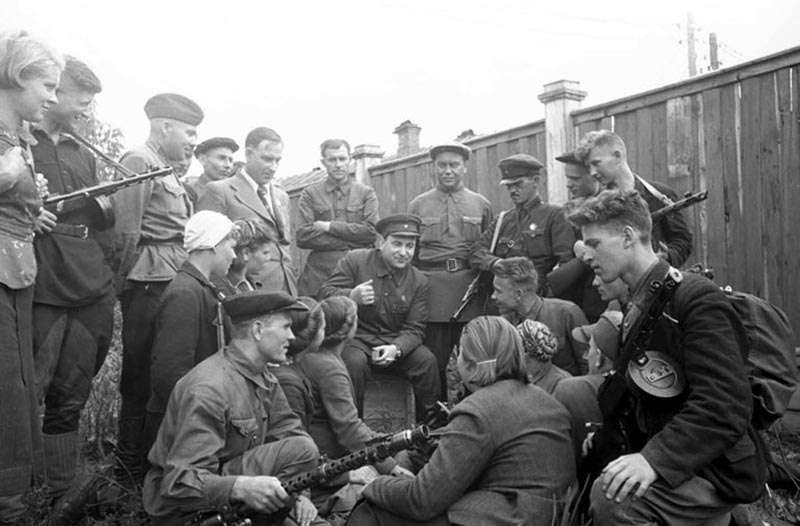
There was no time for a respite, and the 28 of July 1942 was already assigned to the task again: to penetrate the rear of the enemy and conduct deep reconnaissance. The initial plan for the transition of protective German lines was able to make Inna, along with a detachment of intelligence on the "top five". They were not detected. But then she had to act independently and conduct reconnaissance in the area of the villages of Alolya - Pustoshka. And again - deja vu, the situation is repeated in almost identical form.
She conducts reconnaissance successfully, returns from her assignment and decides to shorten the path, moves through the village of Pustoshka, thinking that she will not be caught there, but unexpectedly stumbles upon a German gendarmerie. She is being taken for interrogation to the neighboring village of Yadritsa, where, under the hot hand, a German officer tries to interrogate her, but she is silent, and then he severely beats her: her boots polished to glitter hit hard and aiming at the girls belly, she will fall, suffocating from the pain. The German grabs her hand and burns her hand with a cigarette. More Inna did not remember anything, but when she awoke, she could not breathe deeply for a long time. She was again taken to Pustoshka and thrown into prison. Forced to go to work. In the kitchen, under the supervision of a convoy, she cleans potatoes, dirt falls into a burnt hand, inflammation begins. The companion security guard decided to take the girl to the ambulance station, while he himself remained outside to chat with his comrades on the treacherous arms.
Inna asks the orderly to the toilet. There he sees a small window, crawls through and runs into the forest, the benefit is that the ambulatory station stood on the edge of the village and was practically not guarded. The Germans were convinced that partisans were unlikely to pass into such a deep rear and left small police units consisting of local residents in such villages who preferred to give themselves to their household than follow the instructions of the new German leadership.
After five days, Inna safely reached her unit and again received thanks from the commander for valuable reconnaissance material.
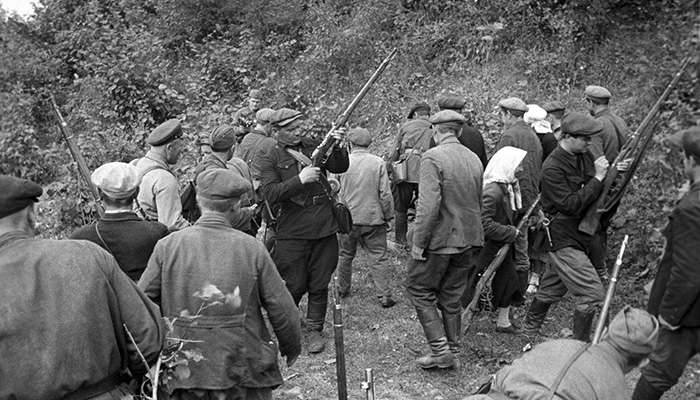
Other intelligence was successful.
And then short-term battles began near the railway station Zheleznitsa, under the villages of Sparrows - Klinovoe, near the village of Dukhnovo (the police garrison was destroyed, the Kolyunovsky bridge was destroyed), where Inna took the most active part.
But most of all her extraordinary behavior manifested itself on 5 in October 1942, when in the village of Kitskovo, Idritsky district, she slowly crept up to a policeman who was on duty, silently disarmed, tied up and led to the squadron. The guerrillas quickly moved to the house, where at that time other policemen were feasting with impunity, instantly disarmed them, seized valuable documents and even a German parish clerk, who during interrogation could tell a lot of interesting things about the stationing of police units.
October 26 1942, with a group of scouts, she went out to explore the passage through the front line. But just before the front line, the Germans wounded one of its comrades, Nikolai Dudushkina. He could not walk, and the girl stayed with him, so that he could then carry him on for three days. Coming out to the advanced posts of the Red Army, she passed the wounded man to the hospital.
Inna was given a little rest at the base, and then they sent her on a short vacation home.
The next combat operation, in which Inna participated, began on March 12 of the year 1943. It was sent to the rear of the enemy as part of the scouts of the Frunze partisan detachment, which later turned into the 16 of the Kalininsk partisan brigade.
24 April 1943 of the year Inna on time discovered a German punitive detachment, up to a thousand people who tried to surround the partisan detachment located in the village of Dorbyshi in the Idritsky district. But Inna promptly notified the detachment command of the upcoming environment - the partisans retreated into the forest without panic. The Germans did not manage to suddenly attack the guerrillas.
Six days later, 30 April 1943, Inna participated in a battle with the Germans in the village of Kurilovo. While in reconnaissance, she encountered German scouts, and was forced to open fire to kill. After killing two German scouts, she returned unharmed with a report on the advancement of the enemy.
26 May 1943 Inna participated in an 12 translation operation for recruited Armenian soldiers who were in the service of the Germans in the village of Guzhovo in the Opochetsky district, but were recruited to our side. The remaining traitors were surrounded, disarmed and removed from the garrison without a single shot. The guerrillas also seized ammunition, food and valuable documents. Inna and during this operation showed itself: she first broke into the headquarters of the German garrison and, together with her comrades-in-arms, disarmed the garrison commander. After that, the entire staff of the traitors, the 38 man, was in the hands of the partisans. In another garrison, the Esenniki, Inna was able, together with the intelligence officers, to recruit several more Armenians who had gone over to the partisan side. The German command, seeing such unreliability, disarmed the remaining Armenians and sent them to concentration camps, believing that they were unreliable soldiers against the war with the partisans.
In the summer months, intelligence activity increased. 5 July 1943, Inna and a group of demolition men (seven people) smashed a German motorcycle and a truck in the area of the Bolshaka Sebezh-Idritsa. But a column of vehicles approached the Germans, and the fascists began to pursue a small group of intelligence officers. Two partisans were injured. One of the bullets hit right in Inna's rifle - it smashed. The girl remained intact. She took the wounded out of the fire, delivered them to the squad. In this operation, the scout killed one officer and several soldiers.
And 22 July 1943, Inna, with a group of demolition men in the Idritsa-Yalovka region, blew up an enemy echelon with manpower, food, ammunition, armament and vehicles. In this crash, up to two hundred Germans were killed and wounded. The locomotive and the seven cars were completely broken.
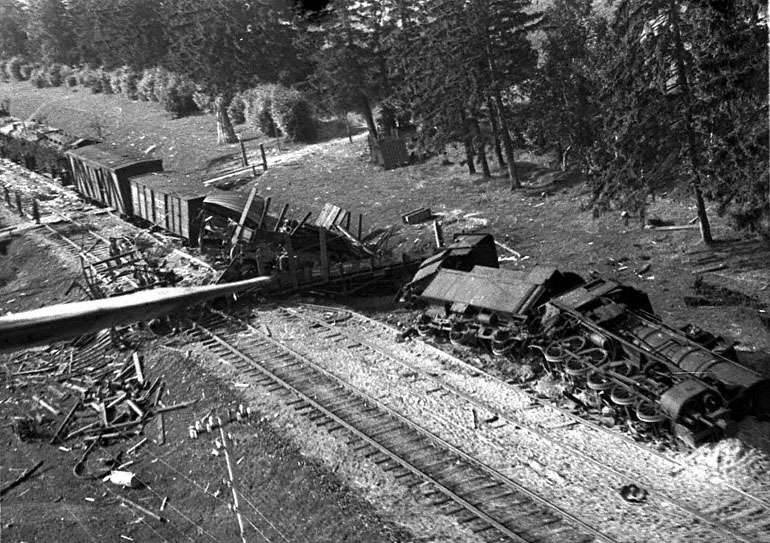
The movement of the fascist trains in this area was suspended for more than a day.
A week later, the girl was again in reconnaissance and promptly noticed a moving convoy of Germans - about 700 people. They were heading towards the location of the partisan detachment. Inna also timely warned her comrades and saved the squad from a possible defeat.
In the middle of August, 13 numbers, Inna again participated in the undermining of ten enemy machines.
Then a long break came in the activity of the partisan detachment: they changed their place of deployment in order to break away from the pursuit.
And finally, in mid-December 1943 of the year, 14 numbers, the partisans organized an ambush in the area of the Raikovo-Maksyutino villages of the Idritsky district. Inna, of course, was together with her comrades. They captured a German passenger car and arrived at it in a partisan detachment, which was at that time in the area of the village of Vlazovičy, Idritsky district.
December 23, 1943 Inna was again in intelligence and saw German Tankswho moved in the direction of the location of the partisan detachment. The girl promptly reported this to the command, and the detachment managed to prepare to repel the attack of German tanks.
The detachment had to break away from the Germans again. When the partisans set up their new camp, combat operations resumed. January 30 Inna 1944, together with a group of intelligence officers under the command of Comrade Leontyev, captured three German “languages”. One of the German soldiers she knotted herself. From the prisoners were obtained valuable data that were transferred to the headquarters of the front.
The Germans were actively looking for an elusive squad. At night, February 8 Inna saw the movement of German intelligence in the area of the village of Zhitniki, followed by a large German detachment from Idritsa, trying to encircle the partisans and catch them by surprise. But thanks to an experienced intelligence officer, the Germans' intentions were again revealed on time and their plans were thwarted: the partisans attacked first. Among the Germans began to panic. They moved back. And again the partisan detachment was saved.
In the spring, March 2, early in the morning, Inna found a concentration of German Cossacks in the area of the villages of Rechka-Leshchani, about a thousand people. They were preparing to surround the detachment, but, not knowing its exact location, they sent their reconnaissance through the forest. But the German intelligence officers discovered, missed them further. The guerrillas were the first to start the battle with the main forces of the Cossacks in the area of the villages Drosche-Leshchan. This fight lasted for about three hours. The enemy was turned into a panic and fled. This stampede was also controlled by the partisans. Inna conducted a deep observation of the enemy: she walked behind him for eight kilometers. The scout revealed his losses and returned to her squad. Where was she waiting for news: the commander sends a group of intelligence officers to the area of the village of Kokino in the Pustoshkinsky area in order to find out the exact number of enemy troops concentrated in the area. The scout, despite her fatigue, voluntarily asked the commander to participate in this task, as she knew these places well.
Two days later, 4 March, a small scout squad arrived at their destination. They decided to take a break. Since the area was saturated with German troops (it was eight kilometers from the front), Inna stepped into the guard. Less than half an hour, as she discovered the approach of the Germans to the place of its location. She woke the partisans. But the Germans were already a few meters away. Inna decided to save her comrades, give them time to break away from the persecution. She was left with a gun to cover their departure. The Germans realized that only one person was fighting against them. They wounded her first in the leg, and then in the shoulder. The Nazis captured Inna alive and tortured.
But there is another version of her death.
The next day, the scouts returned to the place of this unequal duel and found Inna's body.
Secretary of the Kalininsky Regional Committee of the Komsomol N.Rulin 18 of May 1945 of the year signed a petition for Inessa Alexandrovna Konstantinova to be awarded the title of Hero of the Soviet Union.
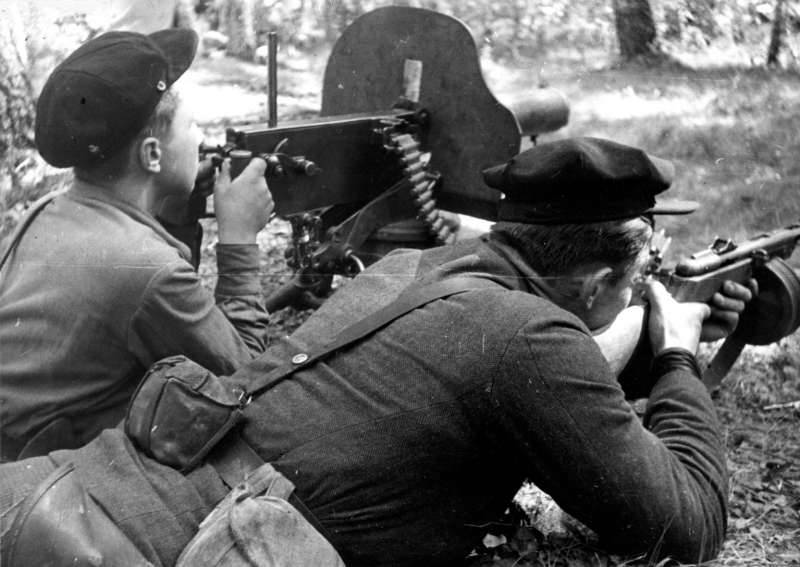
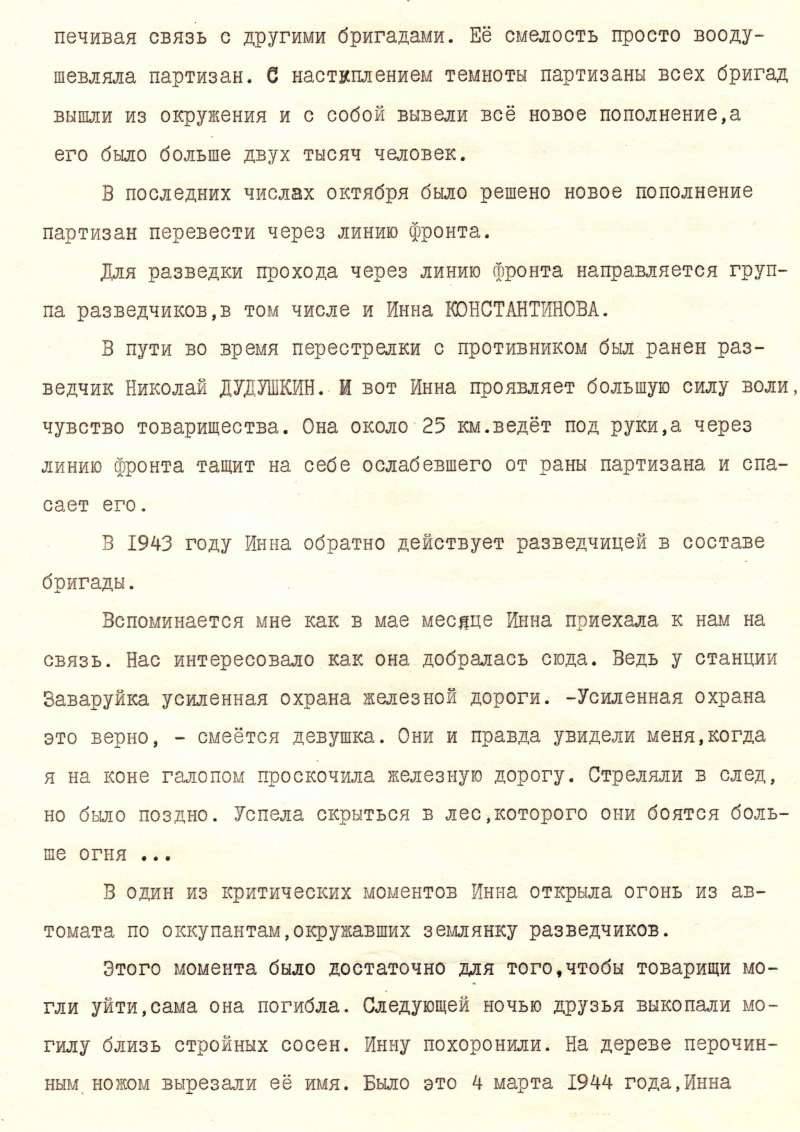
Information